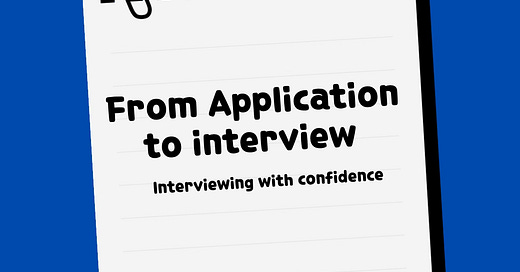You applied for that internship or position. Congratulations! Now, gear up to secure an interview. It's preparation time!
Crafting a compelling narrative is crucial to making a lasting impression during an interview. This is when you bring your resume and life’s work to life. You want to transform your experiences into stories and reflect on your professional and educational journeys, while articulating key experiences, benefit statements, challenges conquered, and skills, including transferrable skills, acquired.
Here is a list of things to do to set you on the path to success as you prepare for your interview.
Know your potential employer: It's true that some athletes, like individuals in various professions, may overlook the importance of thoroughly researching the companies they are applying to. Here's why conducting company research is crucial for athletes seeking employment. A deep understanding of your potential employer is a game changer. This knowledge not only prepares you for questions but also demonstrates your genuine interest and commitment. It’s a strategic move that can significantly enhance your interview performance overall.
Once you have conducted the research, use your findings to tailor responses to some of the questions asked during your interview. By investing time in researching and understanding your potential employer, this proactive approach can set you apart as a candidate who is not just looking for a job but is genuinely invested in the company's success.
Practice makes perfect: Practicing interview skills through mock interviews is a powerful strategy in preparing for the real thing. Mock interviews create an environment similar to the actual interview. Athletes can simulate the atmosphere, questions, and pressure they might face, preparing them for the real thing.
Many interviews include situational or scenario-based questions. Mock interviews allow athletes to sharpen their problem-solving skills and think on their feet, addressing challenges with confidence. Additionally, most companies also ask behavioral questions. These types of questions often require athletes to draw from past experiences and how those past experience can relate to position in their organization in a transferrable way.
Incorporating mock interviews into the preparation routine empowers athletes to not only tackle the expected questions but also to navigate unforeseen challenges during the actual interview. It's a secret weapon that transforms nervousness into confidence and uncertainty into preparedness. If you know people who have interviewed candidates or hired teams, this is good contact to have. You can also tap into your network and friends in the professional world to do the same. If you lack that, this is good time to start networking or connecting with like-minded people willing to help others.
Be calm and confident: As the interview day approaches, remember it's a conversation, a chance for both parties to get to know each other better. Stay calm, project confidence, and be authentic. Nervousness is natural, but reframing it as excitement can positively influence your performance.
Staying calm, projecting confidence, and embracing the interview as a positive opportunity are essential elements in creating a favorable impression. Remember, it's not just about showcasing your qualifications; it's also about building a connection and showcasing your genuine enthusiasm for the role.
Ask Questions: Prepare insightful questions about the role, company culture, or future projects. It demonstrates your genuine interest and engagement. Here’s why asking questions is important :
It demonstrates Genuine Interest: Asking questions shows that you're genuinely interested in the position and have taken the time to research the company.
Evaluates Fit: It allows you to assess whether the company culture, values, and future projects align with your professional goals and working preferences.
Highlights Proactivity: Asking questions demonstrates your proactive approach and eagerness to contribute, leaving a positive impression on the interviewer.
Builds Rapport: Engaging in a two-way conversation fosters a connection between you and the interviewer, making the interaction more memorable.
Example Questions to ask :
“Can you describe the company culture and how employees collaborate within teams?"
"What qualities are you looking for in an ideal candidate for this role?"
“How does this position contribute to the overall goals and success of the company?"
"How does the company support professional development and growth opportunities for its employees?"
“What is the typical career path for someone in this role, and how does the company support career progression?"
“Can you provide more details about the day-to-day responsibilities and expectations for this role?"
"What do you enjoy most about working for this company?"
Remember, asking questions is not just about gathering information; it's an opportunity to showcase your enthusiasm, curiosity, and strategic thinking. Tailor your questions to the specific role and company to make the most impact.
Warning: If you are interviewing with a team or multiple people, do not say the previous interviewers answered all the question. First, this is likely not the case. Second, it will show the person in front of you interviewing that you deem their time or input as less valuable. Many times there will be rubric or evaluation sheet that all interviewers must fill out. A decision could be made on who scores the highest among all the interviewers. It goes without saying you should take all interviewer (no matter the title) equally seriously. We’ve been told many companies that some times a hiring manager may defer to their team on making hiring decisions even though they may have the highest title.
In summary, preparation is not just about knowing the answers; it's about presenting yourself in the best possible light, aligning with the company's expectations, and showcasing your unique qualifications and attributes. It's a strategic investment that significantly increases your chances of interview success.




